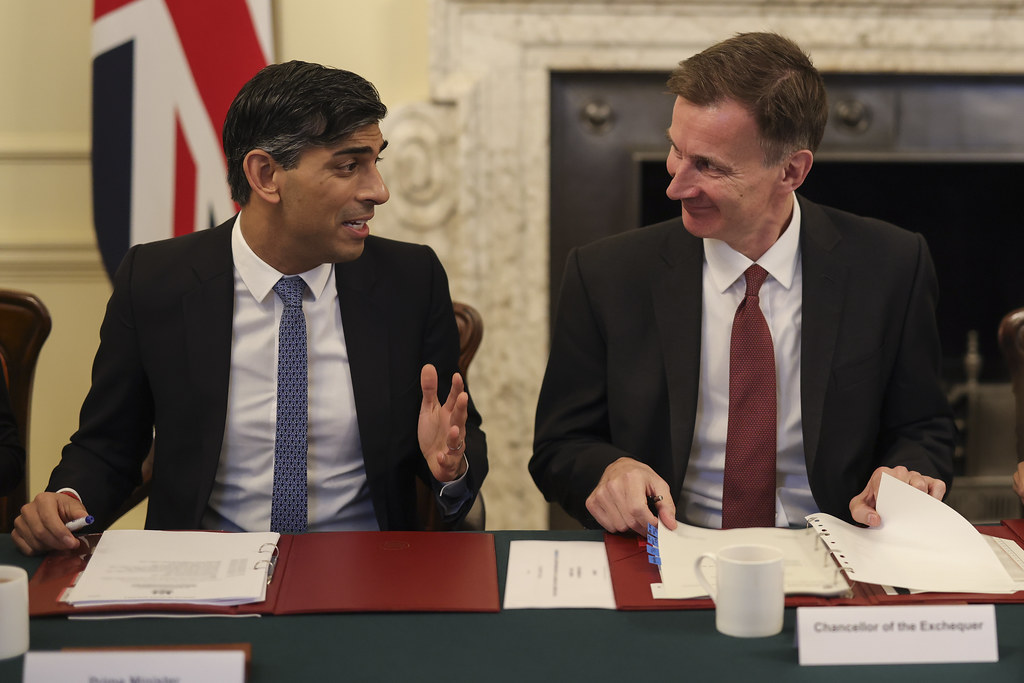The chancellor had been expected to hold off from cutting taxes until next year as he and Rishi Sunak continue to focus on reducing inflation..reports Asian Lite News
Jeremy Hunt is considering slashing the UK inheritance tax rate in next week’s autumn statement after economic forecasters told the chancellor he would have more money to spend thanks to rising tax revenues and falling borrowing costs.
Hunt is weighing up big cuts to the tax people pay after inheriting wealth, paid for in part by better than expected government spending forecasts and by raising benefits by less than expected.
The chancellor had been expected to hold off from cutting taxes until next year as he and Rishi Sunak continue to focus on reducing inflation.
But after UK inflation fell further than expected last month and with Tory MPs clamouring for a pre-election giveaway, sources say the chancellor is open to the idea of doing it sooner.
“Cutting inheritance tax is an option being considered, but it all depends on affordability,” said one person who has been briefed on the options under consideration.
Officials at the Office for Budget Responsibility (OBR) will present their forecasts to the chancellor on Friday for how much “headroom” he has to spend on giveaways without breaking his own fiscal rules.
In the spring the OBR said he could spend an extra £6.5bn and still have debt falling as a proportion of gross domestic product in five years’ time. The Resolution Foundation thinktank has predicted that could now be £13bn, although reports suggest it could be even higher.
Hunt is also considering raising extra revenue by putting benefits up by 4.6% to keep up with October’s inflation figures, rather than 6.7%, which would be in line with September’s figures. This change could save ministers £2bn but would hit an estimated 9m households and cost single mothers an estimated £218 a year.
Hunt and the prime minister have been under pressure for months to use the autumn statement to cut taxes, a move many Tory backbenchers believe will help the party erode some of Labour’s 20-point lead in opinion polls. This week the Conservatives fell to just above 20% in the polls, a level not seen since the aftermath of Liz Truss’s disastrous “mini-budget”.
Nadhim Zahawi, a multimillionaire former Conservative chancellor, has led a campaign to abolish the tax, calling it “the other spectre that haunts us alongside death”.
Hunt is open to the idea of a cut partly because inheritance tax is highly unpopular with Conservative voters and partly because it would cost less than cutting income tax. The Times reported on Friday he was considering reducing the rate from 40% to either 30% or 20%, with a promise to abolish it altogether in the next Tory manifesto.
The Institute for Fiscal Studies has said abolishing inheritance tax would cost an estimated £7bn a year, half of the benefit of which would be enjoyed by people inheriting estates worth £2.1m or more. The potential loss to the Treasury rises to almost £15bn a year by 2032.
The chancellor is also reported to be considering extending tax cuts for businesses that allow them to claim back what they spend on new machinery and office equipment in tax allowances. Hunt said in the spring that he would allow “full expensing” for a trial period of three years, but is now said to be prepared to make the scheme permanent.
XXX
Inflation slows to 4.6%
XXX
Meanwhile, inflation fell sharply in October to its lowest rate in two years, largely due to lower energy prices. Inflation, which measures the rate at which consumer prices rise, dropped to 4.6% in the year to October, down from 6.7% the month before.
The government says its pledge to halve inflation by end of the year has been met early. But there is a limit to how much credit ministers can take for the fall as energy prices settle.
Economists have said the main reason inflation has fallen from its peak of 11.1% in October 2022 is due to a fall this month in the energy price cap, which limits what suppliers can charge consumers per unit of energy. They also note the Bank of England’s decision to raise interest rates, in a bid to cool demand in the UK economy and slow price rises.
Rates are currently at 5.25%, a 15-year high, which has pushed up mortgage costs but also led to higher savings rates.
Paul Johnson, director of the Institute for Fiscal Studies (IFS), an influential economics think tank, said that ministers did not “have a lot of control” over cutting inflation.
Grant Fitzner, chief economist at the Office for National Statistics (ONS), said price rises slowed in October as “last year’s steep rise in energy costs has been followed by a small reduction in the energy price cap this year”.
ALSO READ-Jaishankar, Sunak discuss FTA

